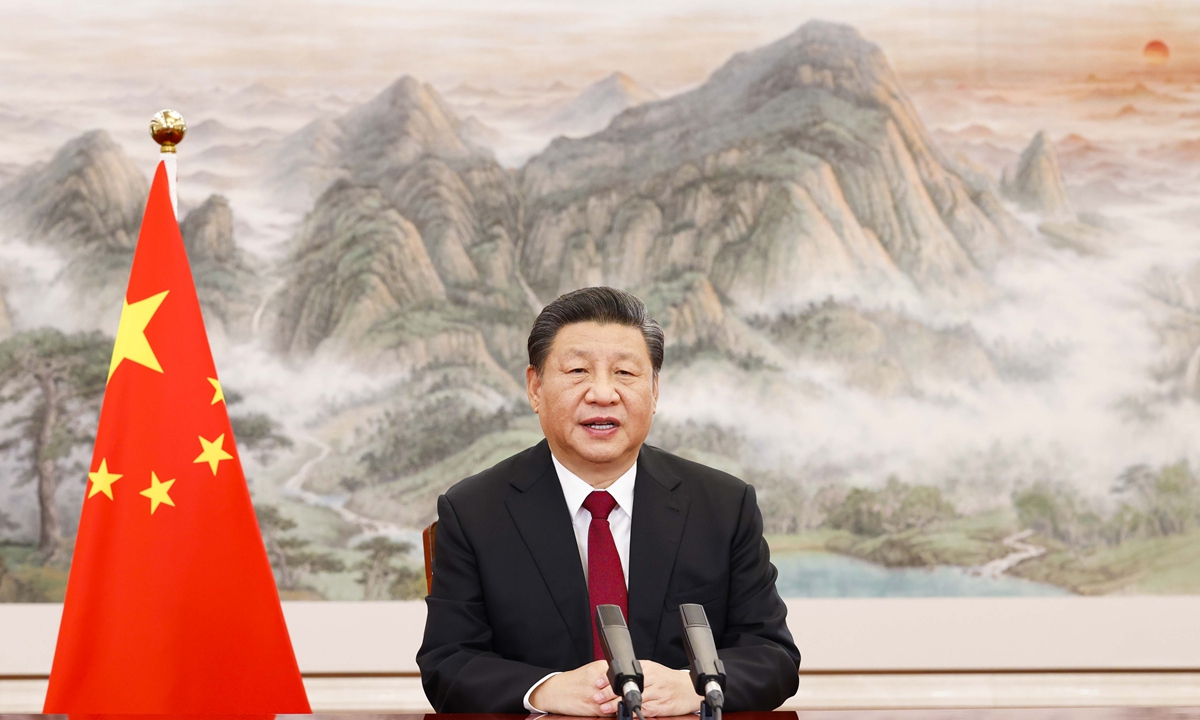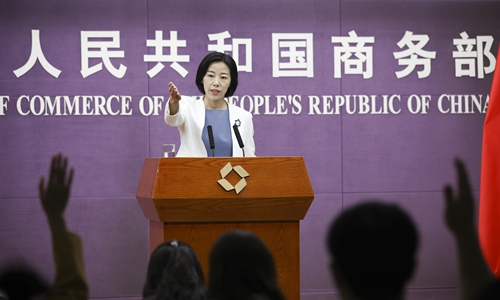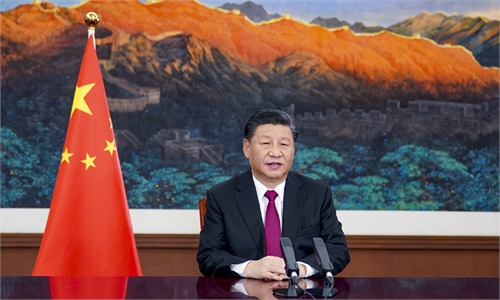Xi to chair summit marking 30 years of China-Central Asia ties
High-level political trust lays foundation for fruitful cooperation

Chinese President Xi Jinping. Photo: Xinhua
Chinese President Xi Jinping will chair a virtual summit marking the 30th anniversary of the establishment of diplomatic relations between China and five Central Asian countries on Tuesday in Beijing, Chinese Foreign Ministry spokesperson Hua Chunying announced on Monday.
The summit will be China's first major diplomatic action facing Central Asia this year and the first heads-of-state meeting between China and the five Central Asia countries. It has great significance for all sides to summarize the achievements and experience in China-Central Asia relations, and seek coordination and make plans for future bilateral cooperation across the board at a new historical starting point, Zhao Lijian, another Foreign Ministry spokesperson, said at Monday's routine press briefing.
The summit will also adopt and release a leaders' joint statement on the 30th anniversary of the establishment of diplomatic relations, Zhao said, adding that relations between China andCentral Asian countries have reached a historic high. Cooperation has yielded historic, iconic results and breakthroughs, setting an example of a new type of international relations and contributing to building a community of shared future for mankind.
China is willing to work with Central Asian countries to carry forward the past and forge ahead, continue to deepen political mutual trust and expand win-win cooperation across the board so as to further upgrade the relationship and bring it to new heights, Zhao said.
Bearing the success of past decades, experts predicted the two sides are expected to have deeper cooperation on trade, energy and people-to-people exchanges, to enhance coordination on international affairs at the historic juncture when regional and international situations are having major changes.
Pan Zhiping, Director of the Institute of Central Asia at Xinjiang Academy of Social Sciences, told the Global Times on Monday that China's relations with each of the five countries and the region as a whole are developing soundly on a solid basis.
China and Central Asian countries have forged solid ties within the framework of the Shanghai Cooperation Organization (SCO), which just celebrated its 20th anniversary. China has also built strategic partnerships with Kazakhstan, Kyrgyzstan, Tajikistan, Turkmenistan and Uzbekistan.
The high-level political mutual trust and frequent high-level exchanges made China-Central Asia relations resilient to instigation and attempts to draw discord, experts said, hinting on the US' role in the region.
With the high-level mutual trust between China and Central Asian countries, Pan pointed out fruitful cooperation in multiple fields, many centering on the Belt and Road Initiative (BRI) which Central Asia plays a pivotal role, citing the China-Europe freight trains as one example.
The BRI was first proposed in Central Asia, during President Xi's visit to Kazakhstan in 2013. In 2020, 91 percent of the 900,000 containers Kazakhstan transported were for China-Europe freight trains, the Xinhua News Agency reported.
According to data released by the Chinese Ministry of Commerce, trade between China and the five countries jumped to $50.1 billion from less than $500 million 30 years ago, representing a 100-fold increase.
There are multiple areas where China and Central Asia can deepen cooperation, including poverty reduction, pandemic prevention, grain security and development financing, experts said, noting China can also work on more infrastructure projects with Kazakhstan, Kyrgyzstan, Tajikistan, Turkmenistan and Uzbekistan.
During the pandemic, China not only sent medical supplies and expert teams to Central Asia, but also provided vaccines, in terms of real doses as well as production capabilities. In September 2021, a production line of Anhui Zhifei Longcom's COVID-19 started manufacturing in Uzbekistan, with an annual capacity of 100 million doses, Xinhua reported.
According to experts, China and Central Asia have a tradition of communication since the ancient Silk Road, and the spirit of dialogue between civilizations was inherited, with both sides respecting each other's culture and development path. The two parties are coordinating closely on regional affairs, namely, the Afghanistan issue, as well as other threats to regional peace and security.
Following the recent large-scale unrest in Kazakhstan which threatened regional peace, China expressed willingness to firmly support Kazakhstan in maintaining stability and stopping violence at the critical moment concerning Kazakhstan's future.
Yang Jin, an associate research fellow at the Institute of Russian, Eastern European and Central Asian Studies at the Chinese Academy of Social Sciences, told the Global Times that despite the US and the West pouring money and spending efforts into these areas to compete with Russia and contain China, Central Asia would work toward closer relations with Russia and be alert to interference from the US and West.
Pan said that Russia has a strong influence in Central Asia. The best-ever China-Russia relations and sound coordination also paved the way to the stability and development of China-Central Asia relations, and the three parties can jointly handle challenges, be it US infiltration or regional terrorist forces.
Also on Monday, Kyrgyz media reported that Kyrgyz President Sadyr Zhaparov will visit China from February 3 to 5, during which he will attend the opening ceremony of the Beijing 2022 Winter Olympics, Kyrgyzstan's AKIpress News Agency reported.
Experts believe that more Central Asian leaders will announce their attendance to show a stance in opposition to politicization of sports by some Western countries.


